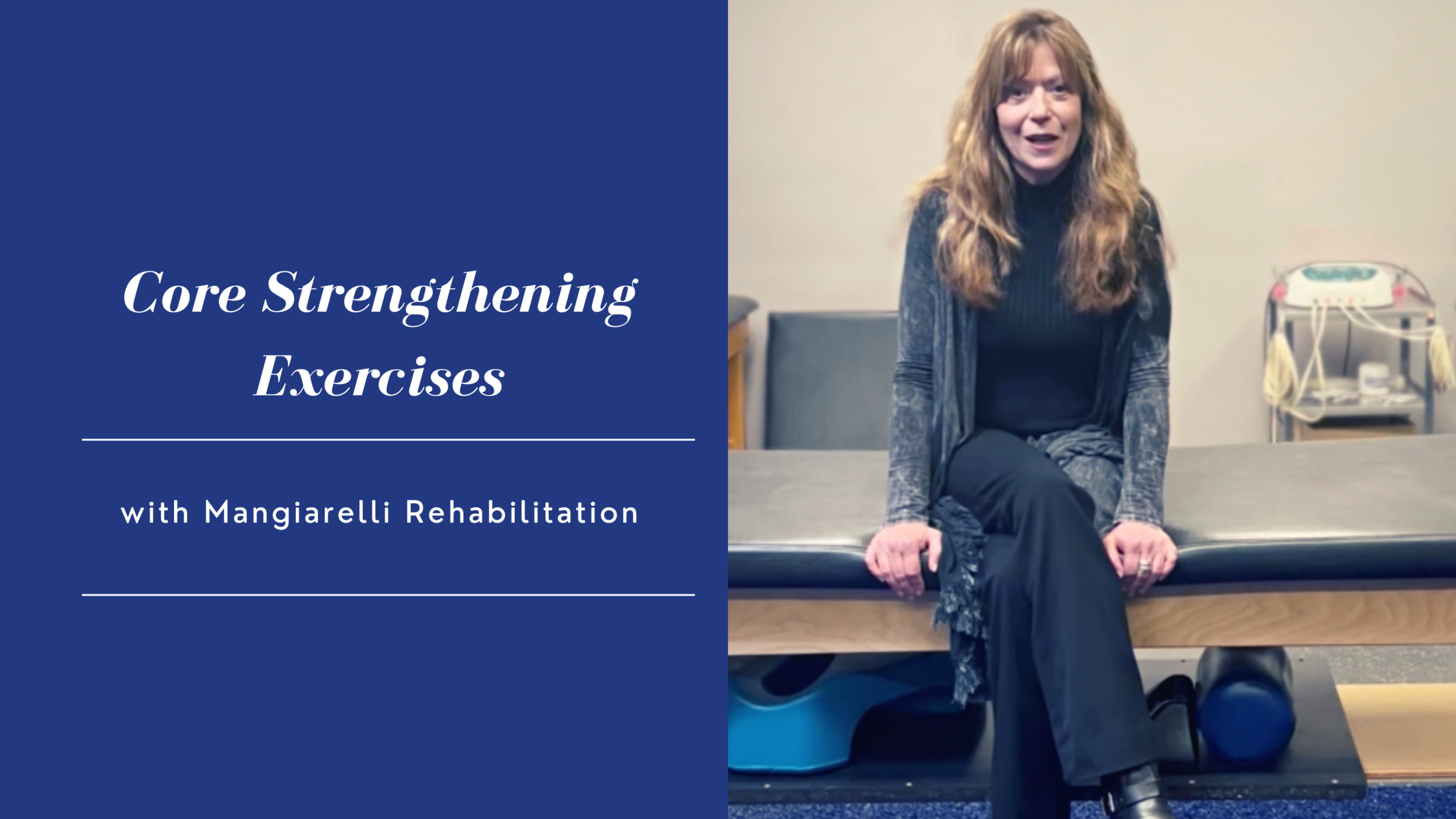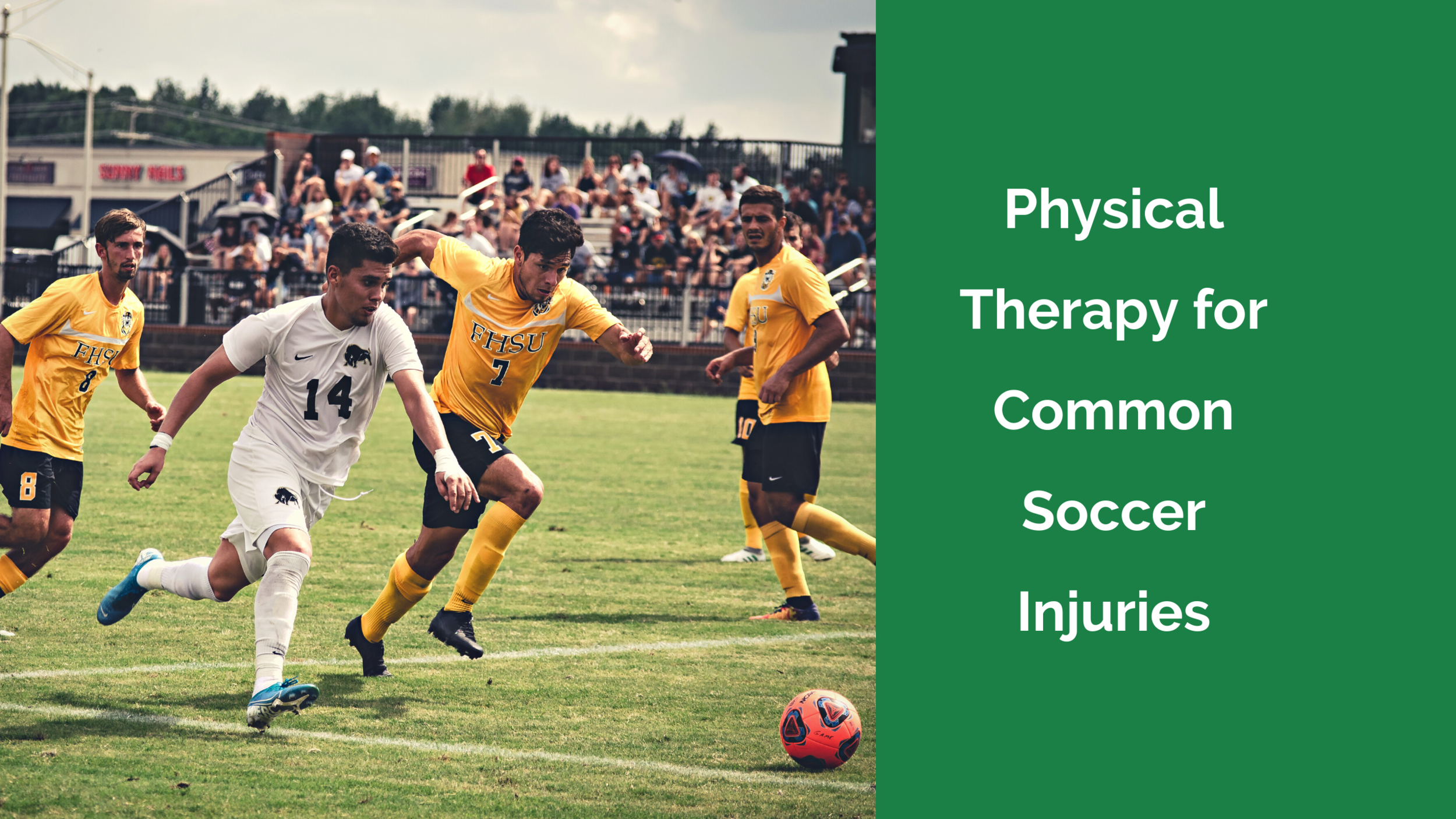Mangiarelli Rehabilitation Physical Therapy Blog
How Physical Therapy Can Help Alzheimer’s Disease Patients
In honor of National Alzheimer’s Disease Awareness Month, we are explaining how physical therapy and therapeutic exercise can help improve symptoms of Alzheimer’s disease and slow the progression of the condition. Exercise improves cognitive functioning, helps Alzheimer’s patients stay mobile and functional as long as possible, and improves overall quality of life. Check out our infographic to learn more!
Improving Balance and Preventing Falls with Physical Therapy
Mangiarelli Rehabilitation physical therapist Jen guides a senior patient through three balance training exercises. Maintaining and improving balance is critical as you age as good balance allows you to maintain a stable, upright position when standing, walking, and sitting and avoid injury from a fall. Physical therapists can help you improve your balance as you age and prevent falls through a customized exercise and balance training program.
What To Expect After a Total Knee Replacement
Are you unsure what to expect after total knee replacement surgery? Check out our blog to learn what to expect throughout the rehabilitation process post-knee replacement! Total knee replacement surgery is a major surgery that requires careful preparation and an effective post-surgical rehabilitation program to ensure pain-free function and mobility of the joint. Physical therapists play a critical role in pre-surgery preparation and post-knee replacement rehabilitation, helping you improve mobility, decrease stiffness, manage pain, and gradually and safely restore function and range of motion in your new knee.
Diabetes Management [Infographic]
Diabetes is a condition in which the body either produces insufficient amounts of the hormone insulin or does not respond normally to insulin. Physical therapy can help diabetic patients manage the condition and improve their physical fitness, mobility, and insulin sensitivity through a customized exercise program. Check out our infographic on diabetes management to learn more!
Physical Therapy for Snapping Hip Syndrome
Snapping hip syndrome is a common injury among dancers, gymnasts, runners, and soccer players. Snapping hip syndrome occurs when a hip muscle or tendon slides and stretches over the hip bone, then snaps when tension is released during movement, causing pain and tightness in the front, back, or side of the hip. Physical therapy can help to loosen tension in the hip and strengthen and heal the muscles and tendons causing snapping hip syndrome for a safe return to sport and dance.
Physical Therapy for MCL Injury
The MCL is the most commonly damaged ligament in the knee that can be sprained or ruptured when a large force is applied to it. The MCL provides support and stability to the knee during lateral and cutting movements and prevents the knee from bending inward toward the other knee. A physical therapist can help an athlete restore function, mobility, stability, and strength to the MCL through therapeutic exercise and targeted strengthening for a safe return to sport.
Core Strengthening Exercises
Strengthening your core muscles has numerous benefits, allowing you to walk upright, maintain good posture, control your movement, and engage in daily work and sports activities. The core muscles are the foundation of movement for your entire body, stabilizing the spine, pelvis, and shoulder. A physical therapist can help you properly strengthen core muscles based upon the functional stability you need for various activities. Mangiarelli Rehabilitation physical therapy assistant, Patti Ciferno, demonstrates beginner core strengthening exercises you can do at home.
Physical Therapy for IT Band Syndrome
Iliotibial band syndrome (ITBS) is a common overuse injury among runners and cyclists in which the IT band becomes inflamed and painful due to repetitive stress on the IT band. The IT band is a thick band of connective tissue that extends from the pelvis to the tibia, connecting to the outside of the tibia just below the knee. Physical therapists can treat IT band syndrome to lessen pain, restore movement, and return to activity and sport safely through targeted strengthening, gait training, manual therapy, and functional training.
Breast Cancer-Related Lymphedema [Infographic]
Breast cancer-related lymphedema can develop in 1 in 5 breast cancer survivors following surgery or treatment that damages or removes lymph nodes. Lymphedema is a build-up of fluid under the skin due to inadequate drainage of the lymphatic system that leads to swelling in the affected area. A certified lymphedema physical therapist can help you manage lymphedema through complete decongestive therapy. Check out our infographic to learn more!
Physical Therapy for Knee Osteoarthritis
On World Arthritis Day, we are explaining physical therapy treatment for knee osteoarthritis. Knee osteoarthritis is a degenerative joint disease characterized by knee pain, stiffness, and decreased strength. Physical therapists can help to reduce knee osteoarthritis symptoms, slow the progression of the disease, and create a customized, comprehensive program of exercise and manual therapy to help knee osteoarthritis patients move safely and improve function, strength, and range of motion in the knee joint.
15 Physical Therapy Myths: Debunked
In honor of National Physical Therapy Month, we are debunking 15 common myths about physical therapy on the blog. October is a month to celebrate and recognize the dedication of each of our physical therapists and physical therapy assistants at Mangiarelli Rehabilitation. Our focus is providing patient-centered, evidence-based physical therapy treatment customized to each patient’s specific condition. However, there are a number of misconceptions about physical therapy and what physical therapists do that we address and explain today!
Hamstring Strengthening Exercises
Hamstring injuries are one of the most common sports injuries, particularly in sports requiring high speed, agility, and explosive power. The hamstring muscles are critical for lower body movement, bending the knee to run and jump and controlling actions such as kicking. Preventing hamstring injury is essential and can be achieved through a targeted strengthening program. On the blog, Mangiarelli Rehabilitation physical therapist Mike demonstrates exercises you can do to strengthen your hamstring muscles.
Physical Therapy for Common Soccer Injuries
Soccer is an incredibly popular sport with over 13 million Americans playing soccer, three million of whom are youth soccer players. Due to the intensity of soccer’s kicking, sprinting, fast changes in direction, and contact and the increase in year-round competition, both traumatic and overuse injuries can occur. Most soccer injuries occur in the lower extremities, particularly to the ankle, knee, and hamstrings. Physical therapists can help soccer players recover from injury safely through a comprehensive rehabilitation program.
What is Work Conditioning and What Are Its Benefits?
Work conditioning is a customized program for the injured worker designed to help the worker regain strength, mobility, motor control, aerobic capacity, and functional skills to safely return to work. Upon completion of the work conditioning program, the physical therapist conducts a functional capacity test to determine the injured worker’s readiness to return to work. Work conditioning reduces the risk of a worker’s re-injury and provides the worker and employer the confidence that the worker can make a safe, sustainable return to work.
Tips to Avoid Autumn Raking Injuries
The season of autumn brings spectacular fall foliage. However, once the vibrant beauty of the colorful leaves fades, we are left with the job of raking and bagging enormous amounts of leaves. Weekly leaf raking can take a toll on your body, particularly if you are engaging in incorrect biomechanics that strain your back, neck, and shoulders. Check out our tips to help you avoid injury when raking this fall!
10 Most Common Myths About Knee Pain
Is it Fact or Fiction? Our latest blog debunks the 10 most common myths about knee pain. Knee pain is one of the most common orthopedic conditions that lead patients to seek physical therapy. Physical therapy provides a safe, non-invasive, and effective way to reduce knee pain, improve mobility and strength, and restore function to the knee.
10 Tips to Prevent Cheerleading Injury
Check out our 10 tips to prevent injury during cheerleading. Cheerleading involves intense gymnastics tumbling, partner stunts, lifts, and tosses. The physical demands of cheerleading contribute to injuries to the ankle, wrist, shoulder, knee, back, neck, and head. Physical therapists can help cheerleaders not only safely heal from an injury sustained during cheerleading, but also help prevent injury through a targeted conditioning and strengthening program.
#PainAwarenessMonth: Physical Therapy for Chronic Pain
September is #PainAwarenessMonth. While pain is an important survival mechanism to protect an injured area of the body, chronic pain is persistent pain that lasts beyond the normal healing process. Chronic pain develops when the nerves that communicate pain to the brain become hypersensitive, causing the brain to perceive that area of the body as a potential threat and therefore painful. Physical therapy offers safe and effective treatment for chronic pain, reducing pain and improving mobility, strength, and function.
Choose Physical Therapy for Safe Pain Management
Physical therapy is a safe and effective alternative to manage pain and reduce the use of opioids. Over the last two decades, opioid prescription rates have quadrupled. Opioids pose a significant risk with serious side effects like depression, addiction, and possible overdose. In 2016, the CDC recommended physical therapy and prescribed exercise as a safe alternative to managing long-term pain and preventing opioid use and addiction.
Exercises to Stabilize and Strengthen Your Shoulder
Mangiarelli Rehabilitation physical therapist, Sarah, demonstrates three exercises you can do to stabilize and strengthen your shoulder. The shoulder is a complex joint that allows for a significant amount of mobility and is stabilized by the surrounding shoulder musculature on and around the shoulder blade. Shoulder instability involves increased laxity of the shoulder joint in which the joint can “slip” in and out of the socket. A physical therapist can address shoulder instability and increase shoulder strength and stability through an exercise program that targets the rotator cuff muscles, scapular muscles, and lower and upper back muscles.



![Diabetes Management [Infographic]](https://images.squarespace-cdn.com/content/v1/5e419cdc97af032560004b99/1636030499983-0YBCZL0Y842JYVPT5ZQN/Blog+Diabetes+Infogr.png)




![Breast Cancer-Related Lymphedema [Infographic]](https://images.squarespace-cdn.com/content/v1/5e419cdc97af032560004b99/1634219007924-NG25RTDSP2VFSV1AKLGH/Blog%2525252BBCRL%2525252BInfogr.jpg)






















